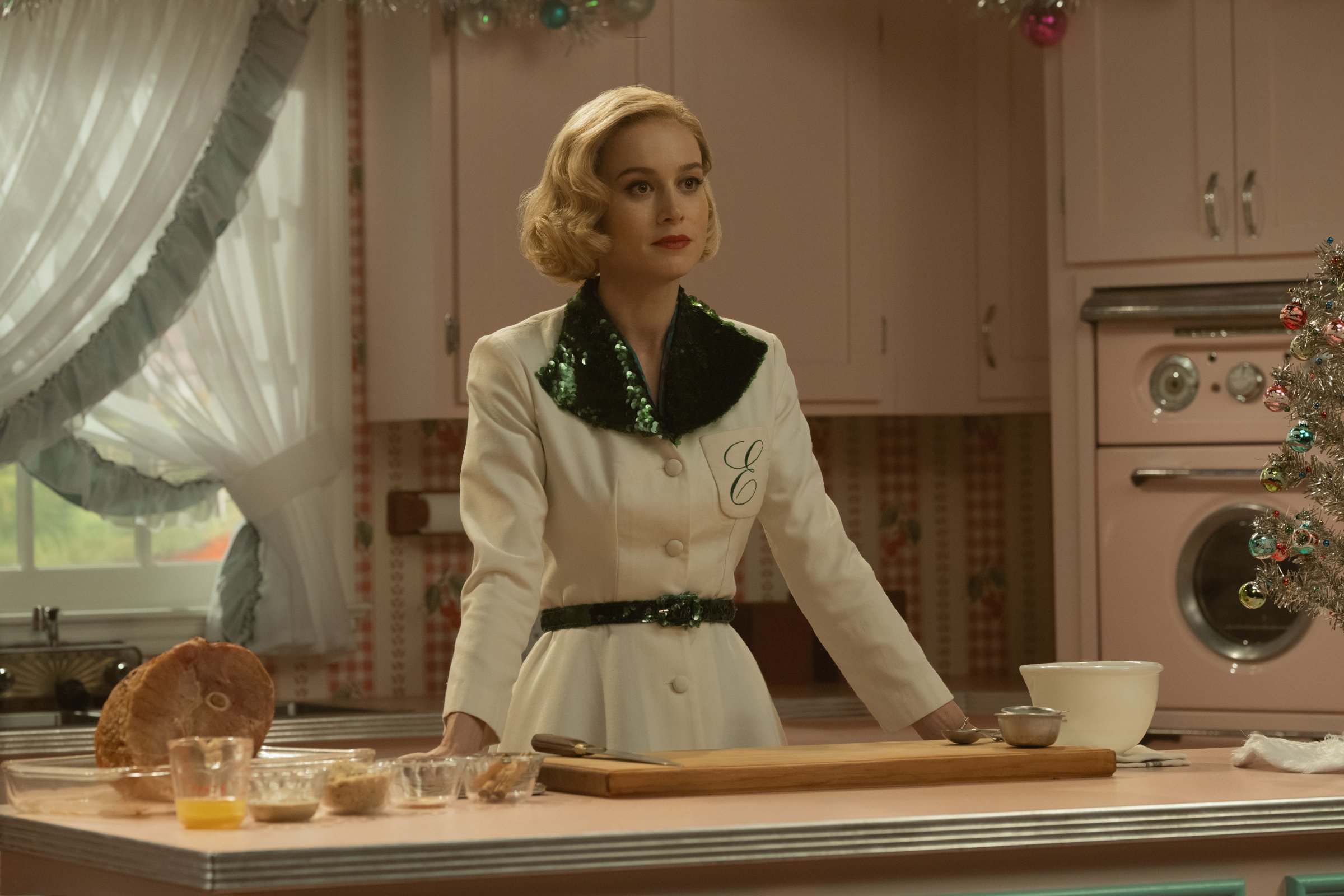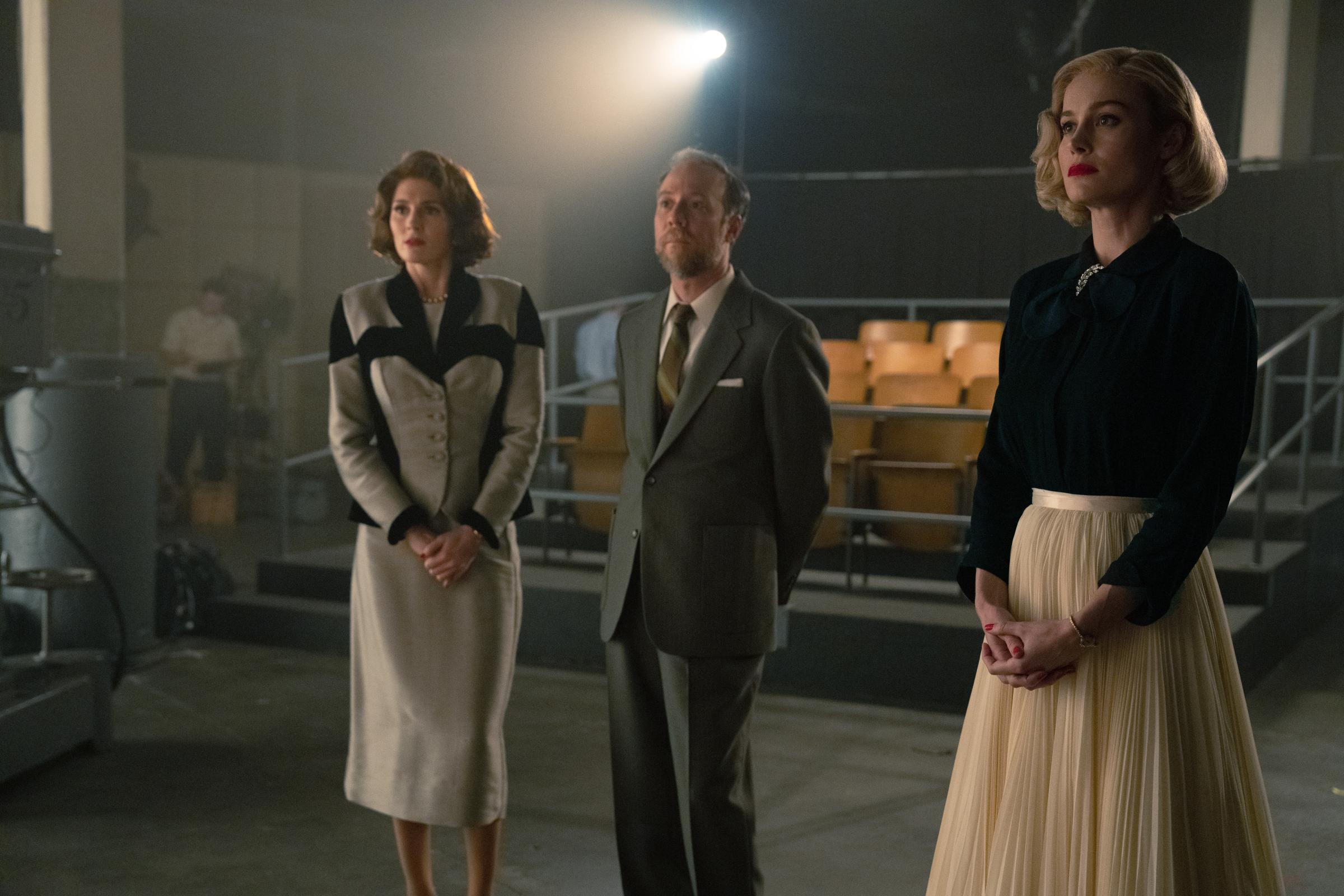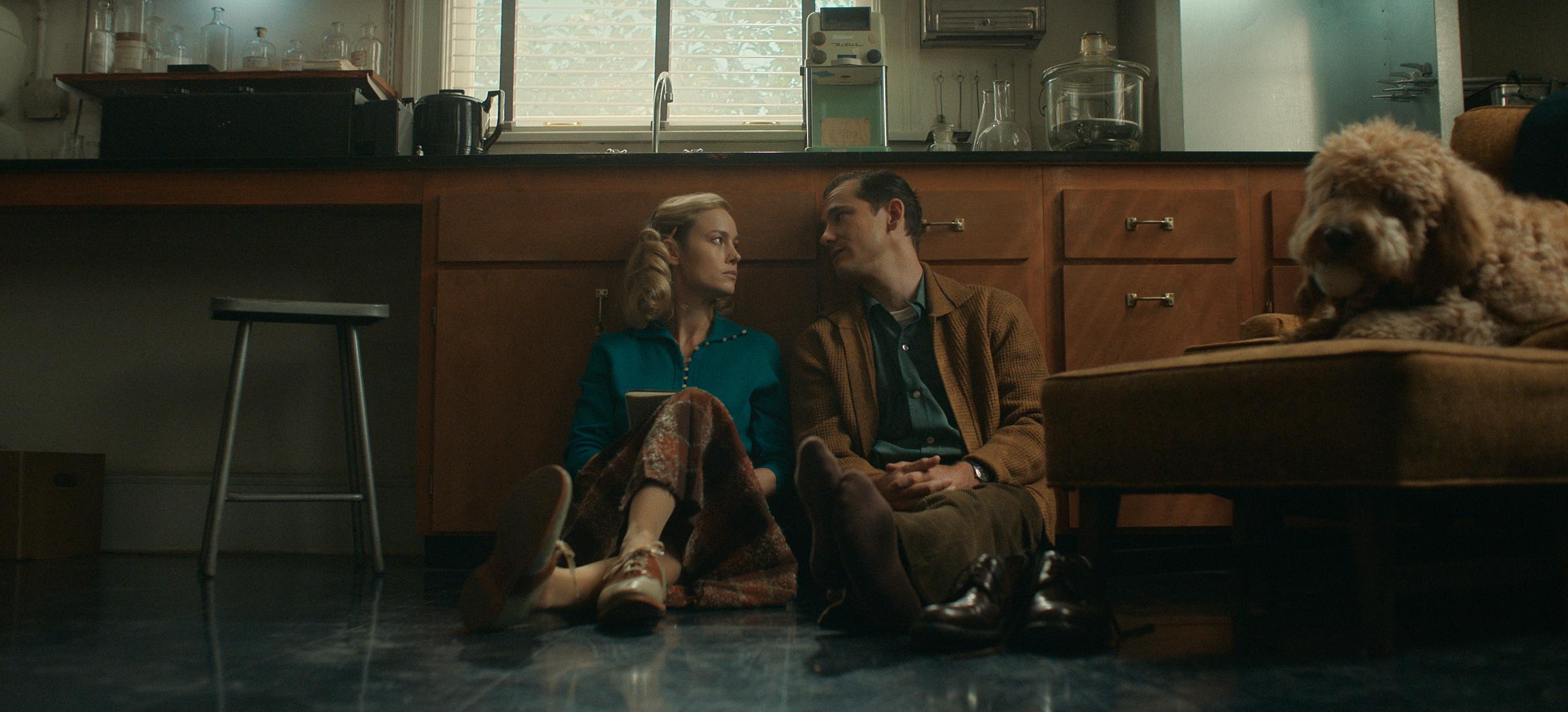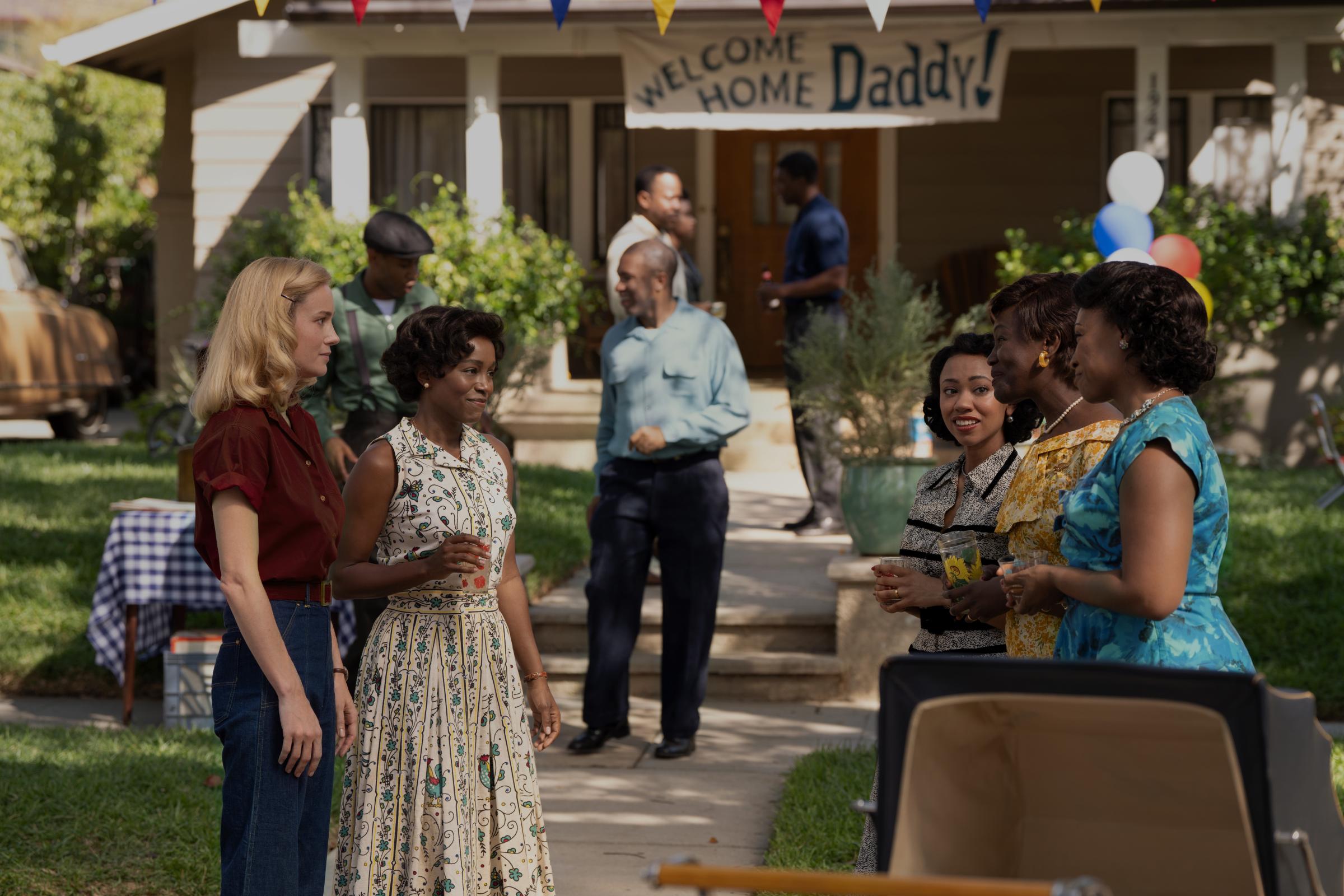
Elizabeth Zott is not like other girls. In fact, maybe don’t call her a girl. The heroine of Lessons in Chemistry is an adult woman and a brilliant chemist whose relentlessly logical mind demands precision. Also, with good reason, she doesn’t take kindly to being infantilized. Unfortunately, Elizabeth’s story—as told in Bonnie Garmus’ wildly popular 2022 novel and a new, eight-part Apple TV+ series starring Brie Larson—takes place in the 1950s. So you can be sure she’ll have to endure a whole heap of sexism to get the respect, let alone the career, she deserves.
Your enjoyment of Apple’s sometimes charming but more often didactic, weirdly unfocused adaptation, premiering Oct. 13, is likely to vary depending on whether you find stories about plucky underdogs triumphing over adversity inspiring or exhausting. Personally, I’m not sure American women are in a position to look back at the overt misogyny (and, elsewhere in Chemistry, racism and homophobia) of the recent past as an obstacle course we can congratulate ourselves for clearing. Then again, maybe that’s not the show’s intention at all. For all its preaching to the converted—and all its invocations of elemental conflicts, like science vs. religion and self vs. community—Chemistry leaves its most ambitious questions unanswered.
To the extent that series works, it’s because Larson so thoroughly inhabits Elizabeth. A genius with little use for social conventions or niceties, the character is confident without being arrogant, and somewhat awkward in disposition but ultimately charming in her authenticity. (Many readers have speculated that Elizabeth is on the autism spectrum.) Her stiff comportment loosens up as her initially lonely existence gives way to a number of meaningful relationships. This subtle transformation, even more than her rise from disrespected lab tech to unlikely cooking-show sensation, forms the through-line of a narrative prone to clumsy digressions.

Although we’ll eventually witness her sad childhood as a preacher’s daughter in ’30s Alabama, Elizabeth’s story begins at the Hastings Research Institute in Southern California. A chemist with a Master’s from UCLA, she performs menial lab chores for mediocre men whose dialogue comes straight out of Ye Olde Chauvinist’s Book of Commonplaces: “A smile once in a while wouldn’t hurt.” “Sweetheart, I could use another cup o’ joe.” Etc. They all but force her to compete in a humiliating “Little Miss Hastings” beauty pageant. As if that wasn’t enough oppression for one woman, Chemistry piles on a layer of sexual trauma. It turns out that Elizabeth never got her PhD because she refused to apologize to the advisor she stabbed (with a pencil) to thwart his (nauseatingly energetic) attempt to rape her (after a qualifying exam).
Things finally start to look up when she meets Hastings’ other oddball. A chemist of national renown, Calvin Evans (Outer Range’s Lewis Pullman) has the influence to indulge his eccentricities—hence the private lab, where he hops in the safety shower after jogging to work. Like Elizabeth, he speaks the terse language of the constitutionally rational. And he sees that the research she’s surreptitiously conducting has the potential to break ground. He’s baffled to learn that sexism has kept her from advancing in a supposedly meritocratic field. “Why would someone discriminate based on something as intellectually non-determinative as gender?” Calvin wonders. (Why indeed!) So he invites her to work alongside him. Soon, they fall in love.

Fast-forward seven years and several spoiler-y twists of fate, and an unemployed Elizabeth—a talented cook who treats the kitchen like a lab—stumbles upon a big opportunity. A local TV station needs a cooking-show host, and though she doesn’t exactly crave fame, she needs the money. Her presence on Supper at 6, where she calls ingredients by their chemical names and takes the preparation of food seriously as work, is something utterly new. And she usually has the fortitude to defy a piggish executive (played by Rainn Wilson) who wants her to endorse shoddy sponsor products and has ideas like: “At the end of each show, she should make her husband a cocktail.” Men tend to hate Supper, but women love it. Elizabeth becomes a celebrity.
This is easily the most intriguing facet of her story. In one memorable scene, during an on-air Q&A with her adoring studio audience, a housewife asks a perceptive question about human biochemistry. Elizabeth senses that the woman has the aptitude to become a physician, and tells her so. Months later, the fan returns to say she’s enrolled in medical school. While this particular sequence of events feels a bit pat, the show is most original when it’s imagining the effect a woman as intelligent, self-assured, and liberated as Elizabeth might have on less extraordinary women, who may be too ensconced in their gender roles to aspire to a life outside the home. But Chemistry hops around too much to explore this aspect of her fame in any depth.
Episodes meander away from one another, cordoned off by puzzling one-off stylistic and structural decisions. One is narrated by Elizabeth’s dog, Six-Thirty (he’s named after the time at which he wakes her up every morning). Another spends an inordinate amount of time with a little girl we’re led to believe is someone she turns out not to be; the payoff of this misdirection is negligible. A coincidence-driven dive into Calvin’s childhood derails Elizabeth’s arc too late in the series, which has the effect of rushing the central story towards an overly tidy conclusion.

This lack of focus extends to characters and themes, as well. A woman introduced as a traitor to her gender returns, fully reformed, a few episodes later. Calvin’s neighbor Harriet Sloan (Aja Naomi King from How to Get Away With Murder) comes into the picture early. A bright legal aide, she’s organizing members of their largely Black, middle-class enclave in a campaign to stop the construction of a freeway through the community—one that local politicians have labeled “blighted” despite its obvious affluence. Yet neither her crusade nor her family are well integrated into the central narrative. Often, her presence feels like a test of Calvin or Elizabeth’s allyship. “You’re always talking about the things that keep women down, but who does that include?” she asks Elizabeth. It doesn’t help that the end of her story line is so abrupt.
Chemistry clearly wants to wrestle with big, important ideas. But if Greta Gerwig’s Barbie was Feminism 101, this adult-oriented drama is teaching lessons about social justice better suited to middle school. Unlike the fascinatingly flawed heroine of The Queen’s Gambit, another exceptional-woman saga set in the mid-20th century, Elizabeth comes across as too perfect, too good, too pure. The same goes for Harriet. They are women’s liberation and, in Harriet’s case, the civil rights movement, run through the fine-mesh sieve of respectability politics. Elizabeth and Calvin’s empirically minded atheism is often challenged by Christian characters—some generous true believers and others cruel charlatans. But the show never satisfyingly synthesizes these conversations. It lets the question of how faith and science can coexist hang.
In the end, Elizabeth does a lot of talking about “the inevitability of change.” This takeaway suggests that the outlandishness of many twists—and the series’ hyperactive structure—were intentional. I don’t doubt it, but TV drama is a narrative medium, and a better show would have found a way to craft a cohesive one about the randomness of life. It would have made space to fully investigate complicated themes, instead of dropping them into the void. It would’ve given us a complex protagonist, not an avatar of righteousness designed to star in adversity porn. Maybe that’s expecting too much from the TV adaptation of last year’s biggest beach read. Something tells me, though, that Elizabeth Zott would prefer honest scrutiny to polite condescension.
More Must-Reads From TIME
- The 100 Most Influential People of 2024
- Coco Gauff Is Playing for Herself Now
- Scenes From Pro-Palestinian Encampments Across U.S. Universities
- 6 Compliments That Land Every Time
- If You're Dating Right Now , You're Brave: Column
- The AI That Could Heal a Divided Internet
- Fallout Is a Brilliant Model for the Future of Video Game Adaptations
- Want Weekly Recs on What to Watch, Read, and More? Sign Up for Worth Your Time
Contact us at letters@time.com